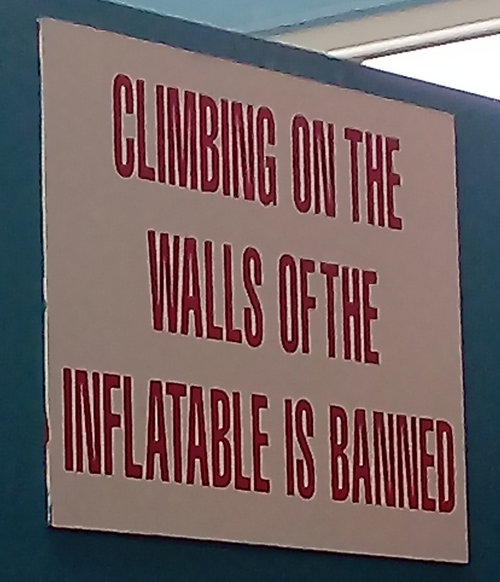I hope you find my writing and business tips and observations useful. My business and blog are dedicated to helping businesses communicate clearly and reach their potential.
Read, subscribe to my newsletter, enjoy!Tash
Who can read the sign?
We attended an indoor play centre recently for a child’s birthday party.
I spotted a sign on a wall opposite an inflatable slide, within the enclosed rock climbing area, that I think was missing the audience.
Where the sign was
The sign was up on a wall and printed in a large font so it should have been useful.
However, it was on an angle that made it hard to read except for by children rock climbing.
Surely putting it above the inflatable would have been more effective as it would be visible at the time you would be considering climbing up the forbidden walls.
What the sign said
Remembering this was in an indoor play centre where most of the patrons are under eight years of age, the sign was not written for the audience.
Apart from the very young children who can’t read at all, many youngsters would not be up to reading ‘inflatable’ and many would not know the word ‘banned’. Even for those who can understand the sign, it will be most effective if people get it instantly, without having to think about its meaning.
The inflatable is more known to children as the big slide, so that is the type of language they would be better using.
A much simpler sign would be “Do not climb up the slide”.
I think this is simpler and more effective, but also has a second meaning as it tells children not to climb up the slide itself, as well as not climbing on the support walls.
It is always important to know who you are aiming your communications at, and aim for clarity more than cleverness.
Hosting location not important
Michelle of Shel Designs added an article to her latest newsletter about where your domain name is registered. She states that where your domain name and hosting are located are not important for your site’s ranking. In fact, she writes “Where it is registered or hosted will not affect the way Google (and other search engines) rank your site.”
I have had clients advised to change their registration and hosting to improve their rankings and it really annoys me when I know they could improve rankings easily in other ways instead of paying a lot of money to move without benefit.
The only ways I think hosting affects a website are:
- great distances between a site visitor/user and the server can make it a little slower. So hosting a .com.au site in Australia or New Zealand would make no significant difference but hosting in the USA might load a little slower
- time zones can make it harder to get assistance
- a drastic event near the server can impact a distant site even though the event wouldn’t otherwise impact on it. For example, when the tsunami hit Asia a few years ago, a number of cables were disturbed under the sea. If your site connected to its server via those cables it may have been unavailable whereas an Australian server connection wouldn’t have been damaged. Obviously, this isn’t a frequent occurrence.
Next time someone tells you to move your website, remember that a reputable distant server/host is better than a close one you don’t know or trust. And it really doesn’t matter where you register your domain name, other than for your pocket (there is a huge variation in registration fees.)


Recent Comments